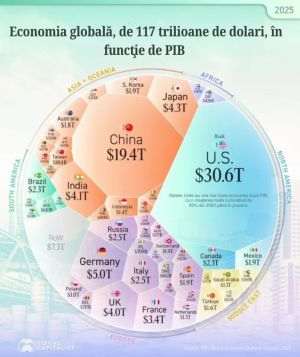An interview with the governor of the National Bank was extremely necessary to our readers - businesspeople - at this point and Mr. Mugur Isărescu was kind enough to generously allocate some of his time to give us one.
The interest rates, the exchange rate, the inflation rate are all lead topics in the business world at the beginning of this year, when business budgets and plans are executed. But now, in January 2008, during a period of changes in the process of our European integration, our indexes have fluctuated in ways that cause much concern in the broader context of the expanding global crisis triggered by the US real estate market.
This is why the answers provided by Governor Mugur Isărescu to BURSA"s questions - in fact, our readers" questions - are all the more adequate to the needs of the moment.
The interview is quite extensive. We will publish it in at least three successive episodes.
The subject of this episode is confidence in the national currency - "The bet on the leu."
The next episode is dedicated to the governor"s answers regarding inflation.
• The 3.3 RON/EUR rate
Bursa: Governor, are you still betting on the leu?
M. Isărescu: Of course I do. Anyone who keeps their savings in lei or borrows lei is safe from the currency risk. I would also like to make two points to avoid any misunderstanding.
The first point. When I referred to keeping savings in lei, what I had in mind was relatively longer periods of time and not "bets" such as: "those who had euros in the first 14 days of the year would have won." The recommendation: "keep your savings in lei" was actually made a few years ago and it is quite obvious that those who chose to follow it, won. The point is that a calculation should be made over longer periods of time instead of shorter, approximate periods that are only convenient to those who wish to voice some criticism or not...
The second point is about the fact that I addressed those whose earnings are denominated in the national currency - the majority of the Romanians, that is. Those who play with one currency or another take chances and become part of some sort of a lottery of uncertain consequence. Moreover, we should not overlook the trading costs (exchange fees, transfers from one bank to the other, terminating a deposit before maturity etc), which are quite substantial. We also should not underestimate the difficulty of forecasting the exchange rate. This remark is quite suitable to the context, I believe; if it were not, quite a few people would start doing currency arbitration. But the point is, you cannot arbitrate, unless you have quite large sums of money.
For quite a long time, the National Bank has been warning about currency risks and the fact that, when it comes to both saving and (especially) lending, those who play this game take chances. The ability to borrow or save in foreign currency is a liberty that was demanded and granted to the citizens of Romania after 1990. I would be very sad if such liberty, which the National Bank advocated vehemently, backfired at us as a reproach.
Bursa: Nevertheless, you repeatedly gave the advice: "Keep your savings in lei!" Considering the current exchange rate, the euro-denominated deposits are much more profitable. Is your advice still valid?
M. Isărescu: It is valid, but considering what I"ve just said. The interest rate on lei is substantially higher than on euro. However, I believe that your questions are based on a misunderstanding. From what I have noticed in the media, the understanding would be that "keep your savings in lei" is the equivalent of the idea that the leu could grow continuously in nominal terms. Neither I nor anyone else at the National Bank has ever said that because that would have meant that the National Bank was upholding an entirely unrealistic scenario, namely that, in a few years, the leu would have matched or even exceeded the euro. On the contrary, we warned about the exchange rate volatility and fluctuations, which can be excessive sometimes. It was on several occasions that we pointed out, without making any exchange rate prognosis, how the exchange rate had fluctuated in the countries that joined the EU before us - the Czech koruny, the Slovakian koruny, the forint, the Polish zlotych. And we said there were cycles of two-three years of ups and downs until things settle. If someone understood that to bet on the leu means to bet on a permanent nominal appreciation of the leu, they misunderstood.
Moreover: the National Bank repeatedly emphasized that, when reference was made to the appreciation of the leu, the significance was "real appreciation" of the exchange rate. Real appreciation means that the exchange rate is corrected by the inflation rate differential. As long as the inflation rate in Romania is higher than in the Eurozone, even if the nominal exchange rate is stable, unchanged, we still have real appreciation. Real appreciation can coexist with a cyclic movement: cycles of two-three years of appreciation followed by depreciation and then appreciation again, until things settle. If it were not so, the matter of the balanced exchange rate would no longer exist and there would not be a need to wait for a long time to wait before adopting the euro.
Bursa: The exchange rate exceeded 3.7 lei for one euro at the beginning of the year. Do you agree with this level?
M. Isărescu: In a globalized world - plus the liberalization of the capital account - we are definitely exposed to external shock waves. The world economy is going through turbulence. Even if the subprime credit crisis in the United States did not have a direct impact on Romania as far as I can see, an indirect impact is already visible: the investors" feeling about Romania has changed; Romania"s country reports and ratings have taken a definitely pessimistic turn in some cases.
Generally speaking, although we have flexible rates and a flexible rate is necessary in the context of the capital account liberalization, we do not agree with significant exchange rate fluctuations. This is the case of the exaggerated appreciation of the exchange rate in the spring and summer of 2007, which the National Bank countered both verbally and by significant reductions of the interest rate (the latter, of course, in corroboration with the inflation rate reduction). These measures obviously tempered the appetite for the appreciation of the leu. If you remember, in June 2007, both the domestic and the international markets expected an exchange rate of 2.7 - 2.9 lei for a euro. But, retrospectively speaking, I cannot refute the recent opinions that it would have been better if the nominal appreciation of the leu had not exceeded 3.3 for a euro. However, we have accepted the risks related to the full liberalization of the capital account. We live in a world where capital movement, which otherwise brings more transparency, more technology, more integration into the world economy, can also bring negative effects. This is why we should not be too surprised to see that the same analysts who said a year ago that the euro would definitely go below 3 lei are now saying that it will exceed 4 lei. It is obvious that the economic fundamentals have not suffered any essential changes for the past year and cannot possibly justify such a change in the evaluation. In fact, it is about the change of the investors" feeling about Romania, in the sense that the appetite for venture has decreased.
In this light, the variation in the leu"s exchange rate that we saw in 2007 is typical of the template/ behavior of the currencies of the member states that have flexible/ floating exchange rates (the Czech Republic, Poland, Slovakia) in the years that followed their accession. I am considering the +/- 15% range stipulated by the Maastricht criteria, but I would like to point out that we do not know yet the leu"s balanced exchange rate.



























































